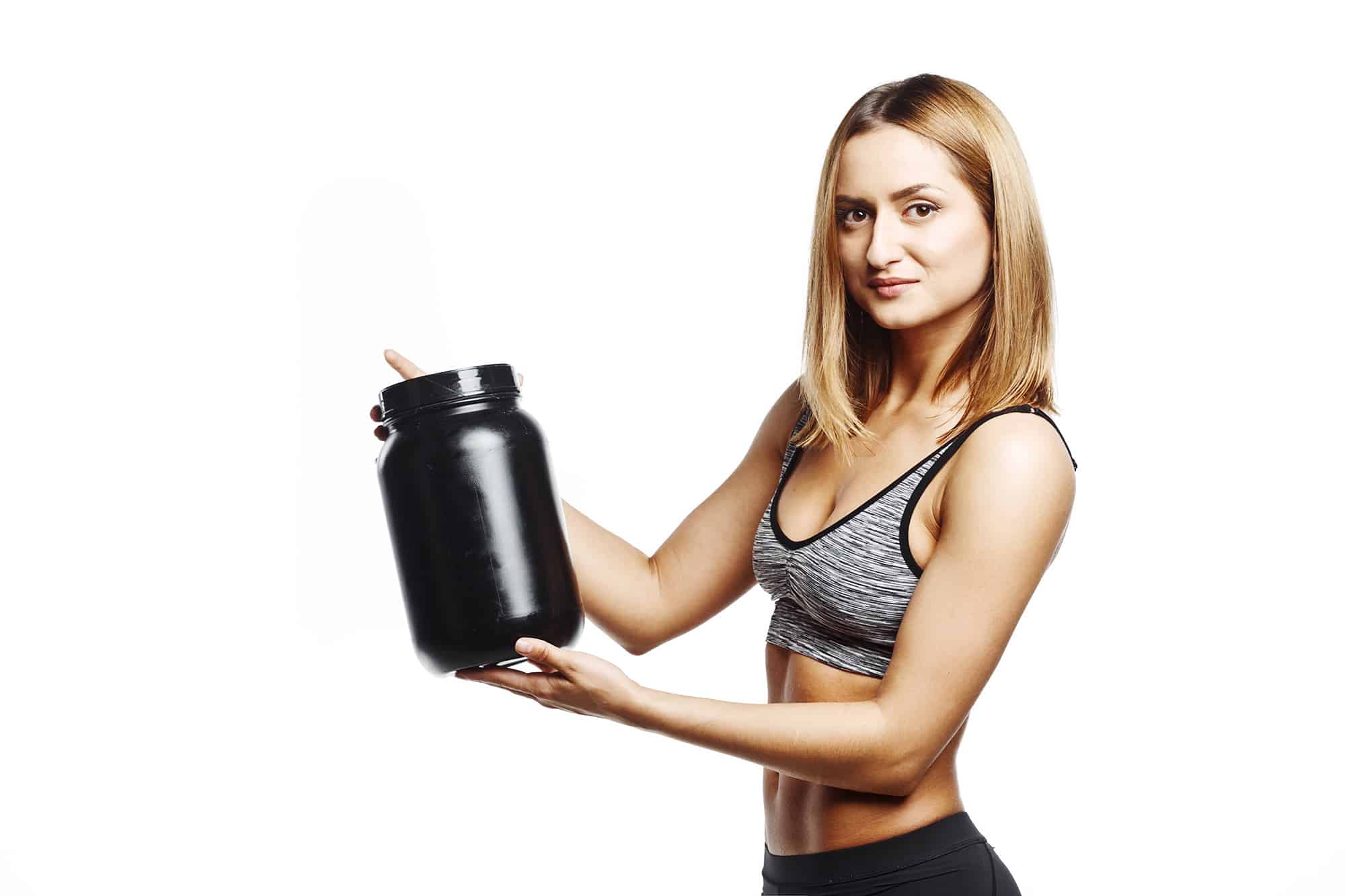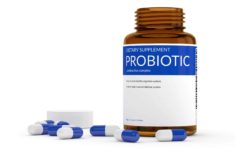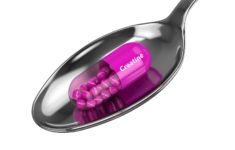Creatine is a natural substance or an organic compound mostly stored in your muscles, or, to be more precise, your muscle cells. It can be found mostly in meat and fish.
Creatine is one of many amino acids. As an amino acid, creatine is made in your body, from other amino acids, namely from glycine and arginine.
You could ask the question what’s all the fuss about creatine?
Well, creatine is highly popular in sports nutrition and is a preferred supplement among many women, sportsmen and athletes. Yes, but why is this amino acid special?
Because it can significantly increase your workout performance by employing adenosine triphosphate (ATP) which is another organic compound that gives energy to all living things (including you).
Therefore, creatine, if used as a supplement, can shake things up and produce that extra power and energy you need for lifting weights, boxing, hiking, cycling, mountain climbing and every other physical activity your mind can come up with.
Creatine is highly effective when it comes to high-intensity workouts and gaining lean body mass.
Should Women Take Creatine?
Women can take creatine as both sexes have similar anatomy so what applies to men in a lot of cases applies to women as well (we all have a need for muscle building).
Benefits of Creatine for Women
There are overall benefits of creatine regardless of gender. The usual spiel means that creatine is great for high-intensity training and is highly effective for building muscle [1].
Research published in a Journal of Strength and Conditioning Research showed that even moderate creatine supplementation is highly beneficial for lean muscle growth [2].
You could ask: Yes, but what about women, how can we in particular benefit from creatine use?
One study conducted on postmenopausal females with knee osteoarthritis proved that creatine supplements can increase the physical function of the knee, produce more lean mass, improve quality of life and increase muscle strength during exercise [3].
In general, many women over 50 can improve their health and get more energy for work or improve their fitness, workout or exercise.
Women in their fifties have more health problems, which is why using creatine in moderation and for exercise may contribute to wellbeing.
Side Effects of Creatine for Women
In general, if you are a healthy person, and you take creatine and even use it daily, you are going to be fine during your exercise.
Of course, there are general, well-known, side-effects that could occur in both sexes – diarrhea, stomach problems, muscle cramping and of course, the most common – dehydration after exercise.
Should a pregnant woman use creatine? There is nothing yet that suggests this is not a good idea and in fact, there is a study conducted on pregnant rats that showed benefits when it comes to baby rats [4]. However, for things like this, it is best to seek advice from your GP before making a decision.
How Does Creatine Affect Women?
It doesn’t matter if we talk about sports nutrition, bodybuilding or regular weight lifting, the first thing that any women can think of when thinking about creatine is – can creatine make my body masculine?
Any health journal or nutrition blog can tell you that creatine is not an anabolic steroid, or if you’d like, is, an organic compound, which means that females and males have this substance in their bodies occurring naturally.
This, of course, doesn’t mean that everything is perfect. There is a delayed effect of creatine in females compared to males which means that some effects of creatine may occur later (it may take more time to get an increase in performance).
This is why you should always check the dosage of creatine and always consult a doctor if you have some underlying health problems.
Does Creatine Work For All Women?
Not all women can experience the effects of creatine supplementation. Those who do respond, benefit from creatine supplementation and so-called non-responders are missing the benefits in terms of muscle strength and aerobic capacity.
In a study from 2006, two groups of women were examined for 10 weeks. The goal was to measure creatine monohydrate supplementation and resistance training on body composition and strength in women during their training [5].
The first group took the placebo while others used creatine monohydrate. Both groups had similar performances so the conclusion of the study was that creatine had no effect because those women were non-responders or they had a low dosage of creatine.
What Type of Creatine Should Women Take?
There are creatine hydrochlorides, kre-alkalyn, magnesium chelate, ethyl ester, citrate, malate, etc all used for the goal of enhancing performance.
The most popular and probably most effective creatine supplement, especially when it comes to gaining lean muscle mass is creatine monohydrate.
Taking creatine monohydrate 5 grams per day is probably what many nutritionists and fitness experts would recommend.
This is true for both men and women, especially if you are using this creatine supplement to gain muscle mass and improve body composition.
Will Creatine Make You Bloated or Gain Weight?
This is probably the number one fear that women have when they start thinking about taking creatine. Water retention happens because suddenly, your muscles are full of water.
First, don’t panic, this will not jeopardize your health and is perfectly normal when starting with creatine. Your weight gain will not have a long term effect if you are not taking this supplement every day.
In short, creatine can make you gain weight but it’s mostly water so don’t worry.
How Much Creatine Do I Need To Take?
The recommended dosage is around 3 grams of creatine per day. If you start with this dose, you can expect to achieve the optimal results after a few weeks [6].
Alternatively, you can first start with a loading phase, which means taking 20 grams of creatine a day for at least a week (for faster results).
Loading phase means consuming 20 grams of this supplement for 5 to 7 days and the effects include higher amounts of creatine in your muscles which can benefit your high-intensity workout and improve your performance.
There are other phases and ways of using creatine for maximising your results. If you want to increase your muscle gains and energy levels, you should consider creatine cycling.
Why Is This the Recommended Dosage?
Both loading phase and taking a smaller dose for a couple of days are recommended for the purpose of achieving better results, having more strength, power and endurance.
For example, one study analysed resistance training and showed that a group of women who used creatine supplementation had a strength increase as compared to the group that didn’t use creatine [7].
Another research examined female soccer players. The results proved that women who used creatine had much more energy and achieved better results in their workout than female athletes who were given placebo [8].
When you combine creatine with other supplements, make sure to check the dose and get all the ingredients levels correct because an uneven distribution of supplements can produce bad results over time.
Your nutrition plan has to be optimal just like your time if you want to get maximum in your performance.
Is Creatine Vegetarian Friendly?
Creatine can be found in meat but as an amino acid, it is considered to be vegetarian and vegan friendly. Vegans and vegetarians are advised to add creatine in their meals if they want to build muscle.
Can Women Take Creatine Even If They’re Not Working Out?
Since creatine has no calories, using it in periods without workouts may be beneficial.
This supplement can increase the water levels in your body (if you take it every day without training) but it will not produce body fat and will not have any negative effects on your muscles.
Does Creatine Affect Women Sexually?
Aside from the effect creatine has on muscles and energy, there is no evidence that creatine affects women sexually.
Creatine may produce side-effects that we already discussed that can lead to effects on a woman’s body in terms of muscle fatigue, tiredness, etc.
Nothing suggests that creatine can have an effect on female sexual drive.
References
1. https://pubmed.ncbi.nlm.nih.gov/12433852/
2.https://journals.lww.com/nsca-jscr/Fulltext/2009/05000/Effects_of_Creatine_Monohydrate_and_Polyethylene.17.aspx
3. https://pubmed.ncbi.nlm.nih.gov/21311365/
4. https://pubmed.ncbi.nlm.nih.gov/26592720/
5. https://pubmed.ncbi.nlm.nih.gov/17194243/
6. https://www.ncbi.nlm.nih.gov/pmc/articles/PMC2048496/
7. https://pubmed.ncbi.nlm.nih.gov/9390981/
8.https://journals.lww.com/nsca-jscr/Abstract/2000/11000/The_Effect_of_Creatine_Supplementation_on_Muscle.11.aspx






